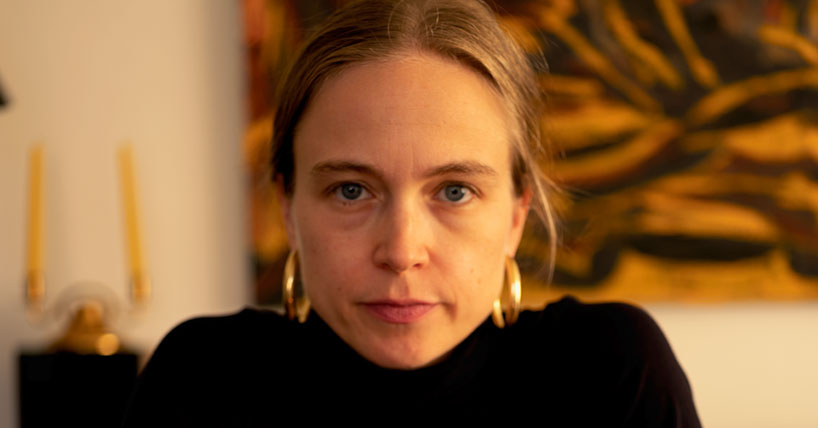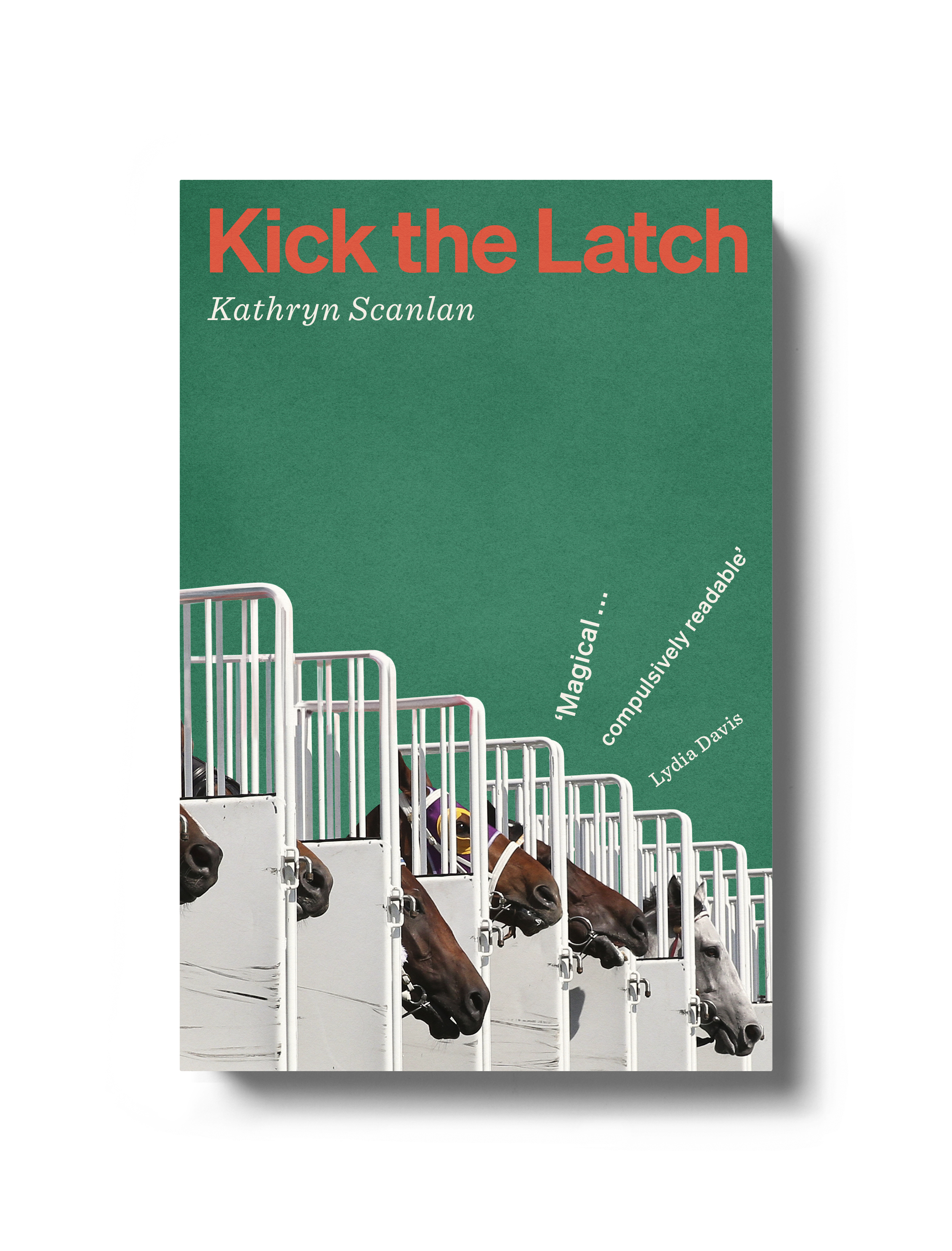Gordon Burn winner 2024
Kathryn Scanlan wins the Gordon Burn Prize 2023-24
Published on: 8 March 2024
The winner of the £10,000 Gordon Burn Prize is Kathryn Scanlan for Kick the Latch, published by Daunt Books.
Bravura investigation
Kathryn was announced as the Gordon Burn Prize winner by chair of judges Terri White at an event at Northern Stage in Newcastle. Kick the Latch is a bravura investigation of authenticy and form centred on the world of horse training. Kathryn wins £10,000 and the chance to take up a writing retreat at Gordon Burn’s cottage in Berwickshire.
The Gordon Burn Prize recognises and celebrates fiction and non-fiction books that are fearless in their ambition and execution which push boundaries, cross genres and challenge readers’ expectations. The shortlist was selected by the Gordon Burn Prize 2023-24 judges Terri White (chair), Charlie Brinkhurst-Cuff, Andrew Hankinson and Sheena Patel.
Founded in 2012 by New Writing North, Faber & Faber and the Gordon Burn Trust, the Gordon Burn Prize has built a reputation for identifying and celebrating brilliant books that often find their readers outside the mainstream. With new sponsorship from Newcastle University and NCLA, the Newcastle Centre for the Literary Arts, the prize fund for 2023–24 has doubled to £10,000.

A thundering achievement
Professor Jo Robinson, Head of the School of English Literature, Language and Linguistics, Newcastle University, said: “The words ’We win, we win, we win’ close Scanlan’s perfect, searing novel. Hers is an exceptional win - and NCLA, and Newcastle University, are delighted to be able to work with New Writing North and the Gordon Burn Prize - in 2023-24 and beyond – to support such innovative and exciting work.”
Chair of judges Terri White said: “Kathryn Scanlan’s Kick the Latch is a thundering achievement, liberated from hard lines of genre and form by a laser-focus on not just excavation, but building of voice. From transcriptions of interviews with a real-life horse trainer, Scanlan carves this uncompromising book of restraint and authenticity. One that scuffs the line between the ‘she’ and the ‘I’. That drags us along, breathless, between the hooves.
"It's the novel in a state of metempsychosis. Scanlan hammering it into submission, bending it under heat, skill, and force. Kick the Latch is of now, yet sharing much that made Gordon's work remarkable in his lifetime and beyond. Worlds made of fact high on fiction’s supply; the sheer weirdness of reality; ability to burrow in a belly and emerge with the truth of a person’s life (and their humanity); a pin-sharp summoning of place; dominance of the first-person; recognition of the complexity of lives in the margins. It seems oddly-fitting that Gordon’s spirit lives on today in the work of LA-based Scanlan and her account of the small world of horseracing in small American towns. I’d call it both a continuing dialogue with a country that brought about Gordon's own reckoning with the novel, and testament to the long-arm of his influence, endurance of his fascinations. Today, Gordon Burn's voice is still heard where this conversation echoes, his touch felt wherever fearlessness and great writing lives.”

A rare beast
Charlie Brinkhurst-Cuff said: “Kick the Latch is a rare beast, setting out with a premise that feels neatly bordered but revealing itself almost immediately to be a desperately consumable piece of literature, pushing boundaries in terms of form and structure but never becoming inaccessible. Scanlan knows how to pierce your heart; I didn't think I would ever fall in love with a horse trainer, but now I can proudly say that I have. This is a book that will make you appreciate the diversity of human experience, and I'd urge even the most uncertain readers to take a ride.”
Andrew Hankinson said: “The choice of subject, the method, the execution - it was all perfect in a book that deserves to be on record as an award-winner.”
Sheena Patel said: “Scanlan has written a remarkable novel, in prose that is tender, sparse and muscular. A worthy winner for this prize, you all need to read it.”
Claire Malcolm, Chief Executive of New Writing North, said: “Gordon Burn was a hugely influential writer, and he was a son of Newcastle. It has been so meaningful to us this evening to bring the Gordon Burn Prize home to Newcastle, uniting as it does this great city of literature with a prize that is now established as part of the fabric of UK literary culture. We remain one of the few high profile literary prizes that takes place outside of London. I think Gordon would have got why that was important. Thank you to our sponsors Newcastle University and NCLA for helping us to realise this vision. Our many congratulations to Kathryn for her superlative novel.”
Kathryn Scanlan was announced as the winner of the Gordon Burn Prize at an event at Northern Stage in Gordon Burn’s home city of Newcastle. Nick Ahad hosted an in-conversation with the shortlisted authors and there was live music from Me Lost Me. This was followed by an after party with White Rabbit books with a DJ set from David Keenan.
The Gordon Burn Prize remembers the writer Gordon Burn, who died in 2009, and seeks to celebrate those who follow in his footsteps. A journalist and author of ten books, his work includes the novels Alma Cogan and Fullalove and non-fiction titles Pocket Money and Happy Like Murderers. Like Gordon Burn’s own work, the prize is open to a diverse range of themes and perspectives drawn from the breadth of today’s cultural and social concerns. The judges seek work that shows an affinity with the spirit and sensibility of Gordon’s literary methods: novels which dare to enter history and interrogate the past; writers of non-fiction brave enough to recast characters and historical events to create a new and vivid reality.
Last year Professor Preti Taneja, Director of the Newcastle Centre for Literary Arts, won the prize for Aftermath, an unflinching work of narrative non-fiction blurring genres and form to understand terror, trauma and grief.



